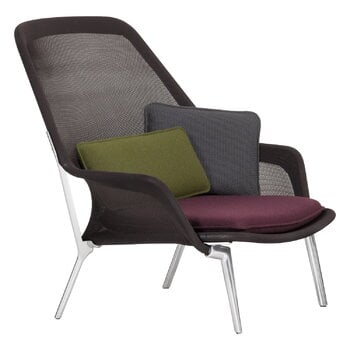Vitra’s Slow Chair is an exceptionally light and comfortable armchair designed by Ronan and Erwan Bouroullec. The comfortability of Slow Chair comes from the fabric sling cover that is stretched over the metal frame. Despite its generous size, the Slow Chair is a lightweight and easily movable furniture, and the translucent knit emphasizes its lightness. The combination is perfected with thin seat and back cushions and appealing colours.
Slow Chair, brown - aluminium
Vitra
Description
Vitra’s Slow Chair is an exceptionally light and comfortable armchair designed by Ronan and Erwan Bouroullec. The comfortability of Slow Chair comes from the fabric sling cover that is stretched over the metal frame. Despite its generous size, the Slow Chair is a lightweight and easily movable furniture, and the translucent knit emphasizes its lightness. The combination is perfected with thin seat and back cushions and appealing colours.
Product details (10)
- Colour
- Brown, aluminium
- Width
- 95 cm
- Depth
- 93 cm
- Height
- 89 cm
- Seat height
- 33 cm
- Frame material
- Steel
- Seat material
- Polyurethane foam and polyester fiber
- Base material
- Powder-coated aluminium
- Notes
- Includes seat cushion and two backrest cushions
- Product ID
Designer
The Bouroullec brothers, Ronan (born 1971) and Erwan (born 1976) are born in Brittany, France and their design office is situated in Paris. The brothers have emerged as one of the most succesful designers in France and they have designed to companies such as Artek, Iittala, Vitra, Alessi, Magis, Flos and Hay. The Bouroullec brothers have also won numerous awards, for example the Steelwood Chair for Magis won the prestigious Compasso D'Oro in 2011.
View all productsReviews (0)
Sustainability
The Product Sustainability Framework, our criteria of sustainable design, helps you find the most sustainable products in our selection. Read below which sustainability criteria this product has met.
Working conditions & labour 7/9
-
Equal opportunities for all employees
-
Commitment to UN Global Compact, fair compensation for all employees
-
Corporate responsibility requirements defined and communicated for suppliers
-
Systematic work for improved inclusion and well-being in the workplace
-
Transparent supply chain
-
Suppliers' compliance to a code of conduct ensured
-
Compliance to the UN Guiding Principles on Business and Human Rights ensured in the supply chain
-
Direct suppliers audited and certified
-
Support for community involvement in the supply chain
Eco-friendly production 7/9
-
Fair and resource-wise water-use in production
-
No incineration or landfilling of returned items
-
No use of endangered species as materials
-
No direct environmental emissions or waste (excl. GHGs) from production
-
Production and material sourcing that respect biodiversity, animal rights, and natural ecosystems
-
Material-efficient and ecological packaging
-
No potentially harmful chemicals used in own production
-
The sustainability of direct suppliers' production is addressed and monitored
-
Positive impact on nature’s well-being through operations that regenerate natural ecosystems
Climate impact 5/8
-
Company's direct greenhouse gas emissions identified and commitment to reduction
-
Product's carbon impact identified and commitment to reduction
-
Guidance on energy- and eco-efficient use of the product
-
Contribution to climate initiatives beyond the brand’s direct operations
-
100 % renewable energy in own production and operations
-
Low-carbon or compensated transportation
-
Carbon footprint of the product calculated and goals set to reduce it
-
Carbon neutral or carbon negative product
Sustainable materials 5/6
-
Sustainable and long-lasting material choices
-
No harmful or hazardous substances
-
Responsible raw material sourcing and production
-
Materials suited for circularity: monomaterials, recyclable finishings, renewable or recycled contents etc.
-
Ecological materials: natural, biodegradable, recyclable or recycled contents
-
Outstanding materials in terms of innovativeness, responsibility, sustainability and circularity: local production or sourcing, 100 % recycled content, C2C-certification etc.
Circular design 5/5
-
High aesthetic quality promoting long-term use of the product
-
Technically durable product design and material choices
-
Design for enduring life-long quality
-
Design and support for product maintenance, repair and upgradability
-
Innovative circular design solutions: circular service system, resale platform, remanufacturing, collection of used products, etc.




